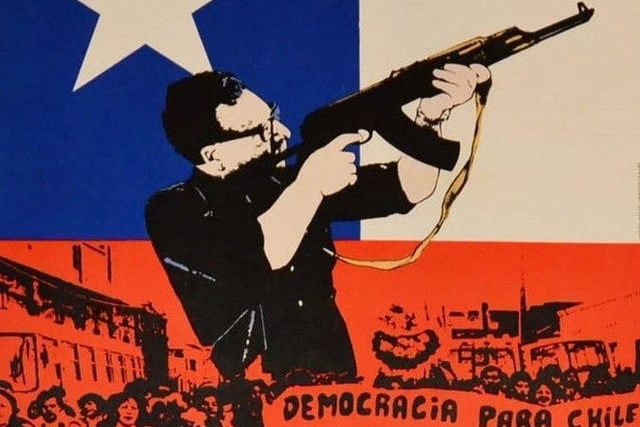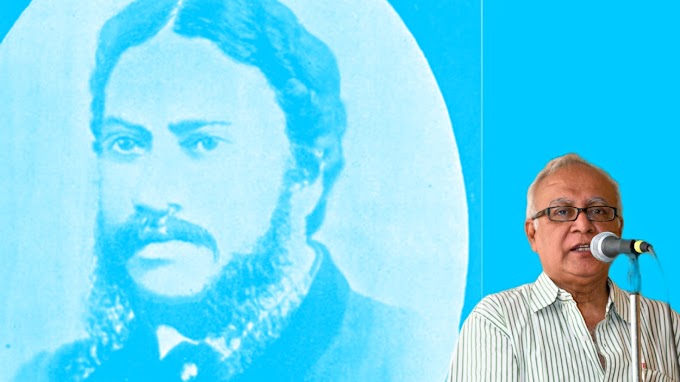Lars Ulrik Thomsen
10 points that separate the international labour movement:
1. All contradictions are fundamentally contained in the opposition between materialism and idealism, between the working class and the bourgeoisie.
When it comes to our definition of the epoch, there are two opposing views that face each other.
Was the fall of the Wall in 1989 an expression of a popular and democratic movement in Eastern Europe, or was it an expression of a counter-revolution?
Many go wrong in this question; the fundamental changes and tendencies in the ´economic formation of society´ continues unchanged by the political conditions.
I. e. when the productive forces require a societal planning and management, then it is the fundamental trend of the development and not the political conditions.
Therefore, it is wrong to talk about a new epoch after 1989, the main content of the epoch is still the transition from capitalism to socialism.
2. The history of the Soviet Union, since 1917, has been the subject of sharp contradictions in the debate on socialism.
If we move away from bourgeois anti-communism, which is class-specific, the labor movement is divided on the issue. The attitudes range from a full rejection of the Soviet Union as a socialist state, to the rehabilitation of the Stalin era in the 1930s.
The first position is non historical, and the second does not differ in principle from the anti-communism of the bourgeoisie.
The second position, which rejects the 20th Party Congress in the CPSU in 1956 and its critique and self-criticism, is an expression of a denial of the dialectical and historical materialism.
History is a contradictory process and it must be treated as such. If one rejects self-criticism and moves on to a glorification of the history of the USSR, one exclude that the labor movement can make progress and learn from its errors and deficiencies.
The dialectical attitude is to analyze all historical events, processes and persons, and reject that which is obsolete and preserve the sound core as a qualitative new cognition.
We cannot do without the history of the Soviet Union, because it gives us the key to the future society!
3. The October Revolution led to the victory of socialism in 1917, and it became the beginning of the world's transition to socialism. This development must be marked by a new definition, in which the capitalist world was exposed to competition from a new system of society. This definition unites both the economic and the historical aspects:
1. The state monopoly development (SMC) led to an intensified struggle for markets and raw material sources.
2. With the victory of the October Revolution began the transition to socialism and a showdown of colonial politics.
3. The rivalry between socialism and capitalism intensified to the extreme after World War II.
4. The race ended with the dissolution of the USSR in 1991, and it became the beginning of an aggressive foreign policy of the great powers for a new division of the world.
5. The deep crisis that capitalism is experiencing in the 21st century, will lead to a sharpening of the contradictions and result in new wars. The parasitic trends in capitalism are often underestimated, because of the technological progress.
6. The problem of bribery of part of the working class is still immanent. Part of the extra profits are used to by a layer of bourgeois representatives in the labor movement. With out an ideological fight against opportunism, the fight against imperialism is without prospect.
7. The general tendency in capitalism is a sharp decline in democracy and civil rights. Fascism is spreading in many capitalist countries, and is also monitored by the ruling class trough general a survey of the citizens.
4. The primary contradiction to day is between the productive forces and the productive relations. This is a result of the new technology, the scientific evolution and new discoveries. We see this in a great number of crises; economic, political, health, refugees, wars, hunger, climate, etc.
This makes the contradiction come to a bursting point, where we either survive as mankind or are destroyed in the accelerating numbers of crises.
This view is identical with the contradiction between labor and capital, between socialism and capitalism. When we are analyzing the single countries there are other contradictions to consider.
How is the labor movement going to deal with these great challenges?
We have to solve the obvious contradictions between productive forces and productive relations. Capitalism must be replaced by socialism.
The principal question is how to understand dialectics between class interests and universal interests?
This is the corner stone we have to solve in present philosophy and dialectical logic, in our daily work. Solving this question will lead to an alliance of the majority of people in each nation, and on an international level.
Here we can learn a lot from ´the unity and popular front policy´ in the 1930s, where the communist movement changed it strategy and tactic, to secure the defeat of fascism and the victory of democracy!
5. The question of value theory is highly controversial in the labor movement. ´The new Left´ does not believe that Marx's theory of values is relevant anymore. Is that a correct position?
It is clear that the major changes in the productive forces are creating uncertainty about our theoretical foundation. The problem is again that they replace materialism with idealism.
Man is the most important productive force, and it is only through his physical work that values are created in capitalism.
When the commodity society is replaced by a new one, new laws appear in the relationship between the physical and the spiritual work. But as long as capitalism exists, the laws that Marx defined in Capital are still in force – still valid.
The intrusion of science into the production – as the development of the productive forces as a whole - can only be properly understood on a materialistic basis. All claims that this process means that material production is replaced by a spiritual are idealistic speculations.
6. Idealism experienced a great upsurge in the 20th century, the purpose being to secure the influence of the bourgeoisie on the masses. How can it be that Marxism and scientific socialism, as the most advanced theory, failed to defeat idealism?
This, in turn, is linked to developments in the USSR. The reforms launched at the 20th Party Congress of the CPSU were slowed down when Brezhnev came to power in 1964.
There had otherwise been a progressive development at the universities, and many young people were well equipped with their education to further develop Marxism.
They were simply not allowed to do so because Marxism was replaced by a ready-formulated Marxism – a doctrinal version that goes against the very core of scientific socialism.
It became particularly evident during Perestroika and Glasnost in the mid-1980s. The ideological foundation was not Marxism, but Neo-Kantianism and positivism. Therefore, the reforms also ended in failure and dissolution!
There is a great deal of work for the labor movement in rediscovering the understanding of logic and philosophy as something that is in constant motion, something that undergoes a constant process of negation and renewal.
7. The rapid development of the productive forces makes it absolutely necessary to have a clear understanding of the formation concepts. We must be very careful to understand the dialectics between absolute and relative truth. About this V.I. Lenin wrote in ´Materialism and Empirio criticism´:
“Human thought then by its nature is capable of giving, and does give, absolute truth, which is compounded of a sum-total of relative truths. Each step in the development of science adds new grains to the sum of absolute truth, but the limits of the truth of each scientific proposition are relative, now expanding, now shrinking with the growth of knowledge.”
This cognition has partly been lost and replaced by relativism, the one that Lenin fought with his writing against the machinists of the Russian Social Democracy.
The problems are particularly evident in the cognition associated with the nuclear industry, where e.g. Niels Bohr and Albert Einstein were dominated by positivism and Neo-Kantianism.
Yet it is valuable to study the contradictions in the logic they applied.
8. The leading role of the working class was already established in ´The Communist Manifesto´ and further developed by the V.I. Lenin in the Works; ´What must be done?´ and ´Two kinds of tactics in the democratic revolution´. Have the communist parties maintained this principle?
They had it until the dissolution of the Soviet Union in 1991.
Impressed by the ideology of the New Left, several parties have abandoned this principle, including The Communist Party of Denmark.
This has happened under the impression of the erroneous perception, which was dealt with in section on Marx's value theory (point No. 5). They no longer perceive the working class as the subject of the revolution, but rather the higher educated, science, etc.
This opportunism and revisionism has also led to the expected slowdown in the class struggle, for what power do university staff have in the class struggle?
Only the working class has the necessary weapon, to be able to paralyze production and put capital in check.
The role of the working class as an avant-garde in the revolutionary struggle is by no means obsolete, but it obviously requires great tactical skill to bring it to life!
9. The debate on the dialectics between class interests and universal interests was at the center of Perestroika and Glasnost in the 1980s. It is also relevant today, with the great crises that characterize the present world.
A victory for the peace forces in the 1980s had meant that the unimaginable means spent on the military, could have been used to solve the problems we face today and which are now in a worsening version.
It is a common knowledge in the labor movement that there is a dialectical relationship between the democratic struggles and the struggle for socialism. How do we make that dialectic work?
It is the sharpened opposition between productive forces and production conditions that leads to the serious crises for the climate, health, ecology, economy, etc.
The dominant role of monopolies in the development of society is characterized by lust for profit, and not by the attempt to solve the serious crises we face.
Therefore, the most important task for the labor movement is to replace the anarchy of monopolies in production with a planned development. What is the dialectic between democracy and socialism on this issue?
It is to unite all the struggles that are taking place in the present, with the question of democracy in all the matters pertaining to society. It is about creating democracy in all sectors of society, both in the private and the public sector.
The demand for nationalization of the most important functions of society must be reconciled with the struggle to resolve the various crises.
It is basically about replacing the idealism that characterizes many with a materialistic view of life!
9. The debate on the dialectics between class interests and universal interests was at the center of Perestroika and Glasnost in the 1980s. It is also relevant today, with the great crises that characterize the present world.
A victory for the peace forces in the 1980s had meant that the unimaginable means spent on the military, could have been used to solve the problems we face today and which are now in a worsening version.
It is a common knowledge in the labor movement that there is a dialectical relationship between the democratic struggles and the struggle for socialism. How do we make that dialectic work?
It is the sharpened opposition between productive forces and production conditions that leads to the serious crises for the climate, health, ecology, economy, etc.
The dominant role of monopolies in the development of society is characterized by lust for profit, and not by the attempt to solve the serious crises we face.
Therefore, the most important task for the labor movement is to replace the anarchy of monopolies in production with a planned development. What is the dialectic between democracy and socialism on this issue?
It is to unite all the struggles that are taking place in the present, with the question of democracy in all the matters pertaining to society. It is about creating democracy in all sectors of society, both in the private and the public sector.
The demand for nationalization of the most important functions of society must be reconciled with the struggle to resolve the various crises.
It is basically about replacing the idealism that characterizes many with a materialistic view of life!
10. The report of Georgi Dimitrov on the VII. World Congress of the Communist International in 1935 was groundbreaking. It laid down the principles of the communist movement – for working class unity and the popular front with other classes and strata.
This alliance policy led to the victory over fascism, along with the military victories of the Allies.
Was this policy specific to the 1930s? No, it came to form the school of the Communist movement after the war and brought significant victories, such as the peace struggle in the 1950s in which it succeeded in averting a devastating nuclear war.
In the 1960s and 70s, the communist parties developed the anti-monopoly strategy, which was mainly based on the Unity and Popular Front strategy.
The core of the program was a popular collection of demands, which meant a thorough democratization of society, nationalization of banks and credit institutions, the largest monopolies in industry and commerce, as well as a democratization of the state apparatus.
This policy led to new victories for the labor movement, but big business was well aware of the dangers and began a counter-offensive.
It allied itself with the far left and others who were critical of the Communists, and willingly made the media available to the severely limited groups, actual parties they were badly enough.
Such are the conditions of the class struggle and the monopolies succeeded in driving the Communists on the defensive. However, it does not change the need to resume this strategy, because it is only through a comprehensive program for a true democracy in each country that the labor movement can gain renewed progress!
Lars Ulrik Thomsen, Mechanic, member of The communist party of Denmark and The Danish Metal Workers Union.
(This article is published in mehanati.in with writer's permission)












0 Comments